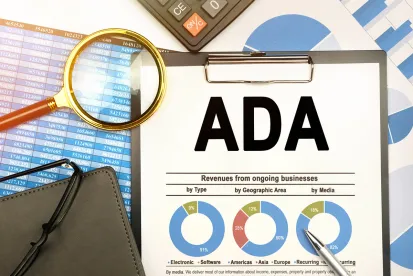In California, the Unruh Civil Rights Act (Unruh) seeks to protect individuals from discrimination on the basis of disability and includes accessibility requirements for privately owned businesses. Businesses that do not comply with federal accessibility requirements under the Americans with Disabilities Act (ADA) are also in violation of Unruh. Such businesses are vulnerable to lawsuits by private enforcers including “tester” plaintiffs, who often target multiple places of business to test ADA compliance. These lawsuits can affect online and brick-and-mortar businesses. We wrote about recent case developments here.
Under California’s existing law, an attorney who brings a complaint alleging “construction-related accessibility violations” must satisfy specific requirements. One such requirement is sending a copy of the complaint along with additional information to the California Commission on Disability Access (CCDA). Existing law also requires the CCDA to provide educational materials and guidance to assist businesses in making new construction and existing facilities accessible to persons with disabilities. These materials include tool kits and online modules.
Now, the legislature has expanded some of these requirements to the Internet, parking lots, and other accessibility claims pertaining to exterior paths of travel. The bill requires attorneys to report to the CCDA concerning the website accessibility lawsuits they file in state and federal courts. The bill also requires the CCDA to provide educational materials to address accessibility standards and requirements for websites. Finally, it requires the CCDA to develop educational materials and guidance that focus on website and physical barrier violations in parking lots and exterior paths of travel by January 1, 2024.
The California legislature passed AB 2917 by an overwhelming majority, likely signaling that Governor Gavin Newsom will sign the bill into law. The bill reflects the legislature’s awareness of the voluminous lawsuits that burden businesses operating in California while maintaining its interest in establishing accessibility standards. By requiring attorneys to provide information on claims and judgments in these accessibility cases, the bill provides the CCDA, and by proxy the legislature, with valuable insight into the incomplete understanding of accessibility standards by businesses. As such, the CCDA will work with state agencies to develop and disseminate educational materials and information to help businesses understand what their obligations are under the ADA, which will hopefully curb lawsuits in the future. This guidance will be important because it will educate businesses on a murky area of technical compliance for the medium most commonly associated with accessibility violations—Internet websites. While it remains unclear precisely what the CCDA actually will roll out and how detailed the guidance will be, it should, at a minimum, provide businesses with some guidance and resources to make their websites and parking lots ADA compliant.
WHAT DOES THE PASSING OF AB 2917 MEAN?
AB 2917 is a positive step toward educating businesses about how to make their websites, parking lots, and other exterior paths compliant with federal and state laws. The bill does not change the existing requirements, but rather expands them to provide more guidance to places of public accommodation. While this will not stop lawsuits in the short term, it may help mitigate the volume of lawsuits in the long term. To better understand their obligations and minimize risk, businesses should work with counsel to understand the contours of the ADA and Unruh.
Lea E. Gierut also contributed to this article.





 />i
/>i

